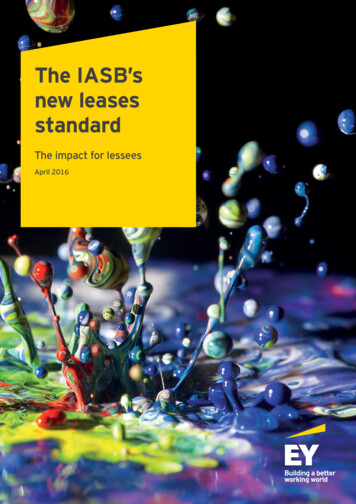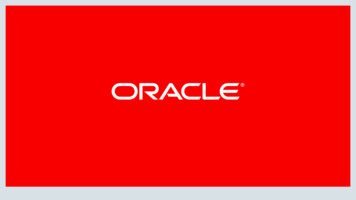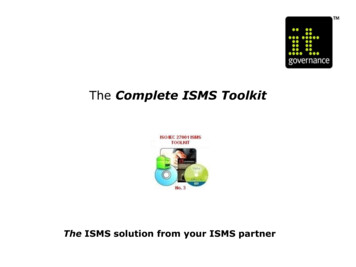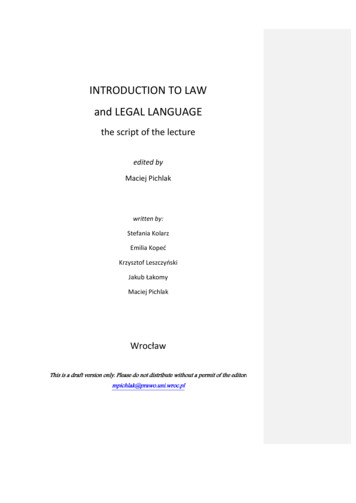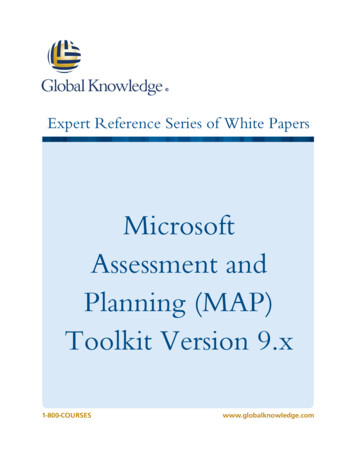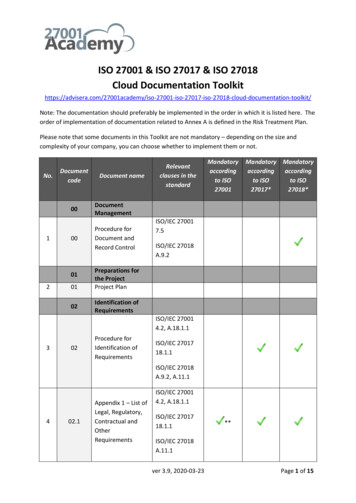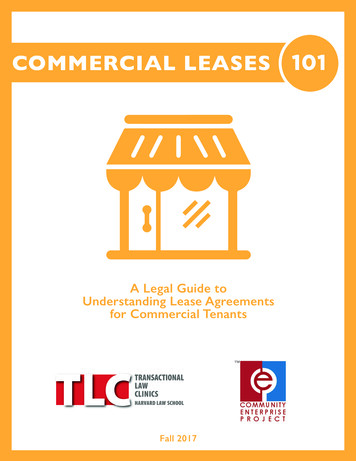
Transcription
COMMERCIAL LEASESA Legal Guide toUnderstanding Lease Agreementsfor Commercial TenantsFall 2017101
AcknowledgmentsThis project and guide would not have been possible without the assistance and support of numerousindividuals and organizations throughout the Greater Boston area. Conversations with Anh Nguyen atBowdoin Geneva Mains Streets raised awareness of the significant need for this type of resource, andwe would like to thank her for sharing her insight into the many issues that commercial tenants in herneighborhood encounter. Special gratitude is owed to Carlos Espinoza-Toro at Jamaica PlainNeighborhood Development Corporation who helped envision what this resource would include andprovided feedback on numerous sections of the document.We would also like to thank Jim McSherry at Dorchester Bay Economic Development Corporation,Ginger Brown at Jamaica Plain Centre South Main Streets, Adam Gibbons at JP Local First, EstherHanig at Union Square Main Streets, Emily Hedeman and Nick Schonberger at the Somerville Mayor’sOffice of Strategic Planning & Community Development, Danielle Joseph at West Roxbury MainStreets, and Charles Vlahakis at Codman Square Neighborhood Development Corporation for offeringideas on what this toolkit should include.We are grateful to Candice Navi for providing design support, in particular for designing the cover ofthis guide.This project also benefited from the helpful input and influence of: Director Brian K. Price, DeputyDirector Joe Hedal, Staff Attorney Marea Parker, Staff Attorney Linda Cole, and Program AdministratorAlexander Horn of the Transactional Law Clinics of Harvard Law School.Finally, tremendous credit is owed to the Harvard Law School students involved with this project:Alexandra Glancy and Michael Trujillo. Working under the supervision of Carlos Teuscher, Director ofthe Community Enterprise Project and Clinical Instructor of the Harvard Transactional Law Clinics,these individuals completed countless hours of legal research, interviews, and careful writing to bringthese materials together.iThis document provides general information for commercial leases in Massachusetts. This is not legal advice. If youneed legal advice, please consult a lawyer. This document is current as of November 2017, but laws change frequentlyand we cannot guarantee the accuracy of this information.
Table of ContentsINTRODUCTION . 1SECTION 1: COMMON LEASING SCENARIOS . 2SECTION 2: SAMPLE LEASE AND EXPLANATORY COMMENTS . 18Introduction . 181. Parties . 202. Premises . 203. Lease Term . 214. Rent . 225. Security Deposit . 236. Rent Adjustment . 237. Renewal of Lease Term . 258. Common Areas . 269. Utilities . 2710. Use of Premises . 2811. Insurance . 3212. Maintenance and Repairs . 3513. Improvements, Alterations and Additions . 3614. Assignment, Subleasing, and Transferring . 3915. Subordination . 4116. Landlord’s Access . 4117. Brokerage . 4218. Fire, Casualty, Eminent Domain . 4319. Default . 4520. Termination . 4721. Surrender . 4722. Holding Over . 4823. Indemnification . 4924. Hazardous Materials . 4925. Force Majeure . 5126. Liability of Owner . 5227. Notice . 5228. Miscellaneous . 53iiThis document provides general information for commercial leases in Massachusetts. This is not legal advice. If youneed legal advice, please consult a lawyer. This document is current as of November 2017, but laws change frequentlyand we cannot guarantee the accuracy of this information.
IntroductionUnlike residential tenants who have certain statutory rights and protections, practically all ofcommercial tenants’ rights in Massachusetts are limited to what is set forth in the lease agreement.Therefore, it is critical that commercial tenants understand what is in their leases to determine whatrights and obligations they will have.We have created this commercial lease toolkit for a dual purpose: (1) to provide an explanationof common provisions in commercial leases and how to interpret and apply these provisions, and (2) torecommend provisions that commercial tenants may try to include when negotiating a new commerciallease. This toolkit is intended to enable small business owners and community organizations who workwith commercial tenants to identify ways to make a lease agreement more tenant-friendly. Allreferences in this document to “you” refer to commercial tenants.This toolkit has two parts:First, we have included a list of common scenarios where we identify provisions in a commerciallease that commercial tenants can initially look to in order to determine their rights and obligations.This section includes difficult situations, such as receiving a notice of eviction or discovering thatsubstantial damage has occurred on the leased premises.Second, we have included a sample lease containing customary lease provisions. We haveincluded explanatory comments, drafting tips, and tenant-friendly provisions that tenants may want toinclude in their commercial lease.Please note that this document is a general summary of the provisions found in manycommercial leases. Not all lease agreements will include the provisions described herein. Because thespecifics of your lease agreement and circumstances will affect how the law applies to you, and becauselaws are constantly changing and it would be impossible for this document to comprehensively addressall of the legal issues that you may encounter, we strongly encourage you to consult licensed attorneyswho have knowledge of real estate and business law before you take any action with respect to thematters discussed in this document. In other words, this document does not constitute legal advice andis not meant to replace an attorney.Finally, please note that the relevant state laws discussed in this document are focused onMassachusetts law. We hope, however, that commercial tenants in other states will find much of thecontent to be helpful as a resource.1This document provides general information for commercial leases in Massachusetts. This is not legal advice. If youneed legal advice, please consult a lawyer. This document is current as of November 2017, but laws change frequentlyand we cannot guarantee the accuracy of this information.
Common Leasing Scenarios and How to Handle ThemAs a commercial tenant, you do not have many rights beside those written into your lease. Thesescenarios are designed to give you an idea of where to look in your lease to determine your rights incertain difficult situations, and who to contact for further information and assistance. These scenariosare not intended to provide legal advice on any specific situation, but are instead intended to provideinitial guidance to you as a commercial tenant so that you can prepare yourself for taking next steps.The guidance below on “how to handle” these scenarios should be seen as a first step.You receive a notice of increased rent.DO NOT: Sign and return the notice.DO NOT: Pay increased rent withoutreviewing your lease and seeking assistance.DO NOT: Ignore the notice.DO: Read the notice and determine why therent is being increased.Where to look in your lease:Rent provision and Term provision: The basic rent and timeline sections of your lease should make theamount of rent clear. The landlord may not change the amount unless it is written into the lease; forexample, has there been an adjustment to his or her costs (see below)? Or has your lease expired, andtherefore your landlord is raising your rent in a tenancy at-will?Rental Adjustment provision: Examine whether the landlord is allowed to raise your rent for increasedproperty taxes, operating costs, or other costs. Does the increase seem unreasonably high? If so, seewhether the lease allows you to challenge the amounts.Renewal of Lease provision: If you have a renewal option, check to see any changes to your rent. It ispossible that upon renewing your lease, the monthly rent will increase.2This document provides general information for commercial leases in Massachusetts. This is not legal advice. If youneed legal advice, please consult a lawyer. This document is current as of November 2017, but laws change frequentlyand we cannot guarantee the accuracy of this information.
You receive a notice in the mail saying that you have a newlandlord.DO NOT: Stop paying rent without speakingto an attorney.DO: Look at your lease and determine howit addresses landlord assignment.DO: Call your local Main Streets orcommunity economic developmentorganization to ask if anyone else hasreceived such a letter. Perhaps there aremajor real estate changes happening in yourneighborhood.DO: Once you are comfortable with thechange, call your new landlord to introduceyourself.Where to look in your lease:Assignment, Subleasing, and Transferring provision: Usually landlords have the right to sell the buildingto whomever they want. However, you can double-check to make sure the lease gives the landlord aright to transfer.3This document provides general information for commercial leases in Massachusetts. This is not legal advice. If youneed legal advice, please consult a lawyer. This document is current as of November 2017, but laws change frequentlyand we cannot guarantee the accuracy of this information.
You receive a letter from a bank saying that your landlord’sproperty has been foreclosed.DO NOT: Assume your lease has beenterminated and move out or stop payingrent.DO: Read the letter and determine what thebank plans to do with the property.Where to look in your lease:Subordination provision: This provision deals with this exact scenario. Usually it will say that if theproperty is foreclosed, the lease may be terminated by the bank. Look to see if there is anondisturbance provision because this would give you a better chance of remaining on your lease.NOTE: You may also have been asked to sign a subordination agreement with the landlord’s mortgagelender separate from your lease. Many of these agreements require termination of your lease uponforeclosure of your landlord’s mortgage, so be sure to read and understand the agreement fully andconsult with a lawyer before signing the document. You should also ask a lawyer to add a nondisturbance provision or other tenant protections to the agreement.Right of First Refusal (ROFR): If you have a ROFR in your lease, you could be in an excellent bargainingposition. A foreclosed property may be more affordable for you to purchase, and you may want toapproach the bank about purchasing the property from them.4This document provides general information for commercial leases in Massachusetts. This is not legal advice. If youneed legal advice, please consult a lawyer. This document is current as of November 2017, but laws change frequentlyand we cannot guarantee the accuracy of this information.
Severe damage or disrepair to the building is making it difficult foryou to continue doing business at the property.DO NOT: Attempt to repair or fix thedamage yourself.DO NOT: Ignore the situation.DO: Take pictures of the damage.DO: Notify your landlord of the unsafeconditions.DO: If you need to fix the damageimmediately, keep records of yourpayments.Where to look in your lease:Termination provision: Look whether you have a right to terminate the lease and under what conditionsyou may do so. Also look at the Default provision to see what happens if the landlord defaults on itsobligations.Maintenance and Repairs provision: Look for who, and under what circumstances, is responsible forpaying for maintenance and repairs. Also look for who is responsible for implementing the repairs (e.g.hiring a contractor). Liability may change depending on if the damage is your (or your guest’s) fault oryour landlord’s fault.Quiet Enjoyment provision: If the landlord is severely interfering with your use of the property to thepoint where you have to abandon the property or shut down your business, you may have aconstructive eviction defense in court. You should consult an attorney.Irrespective of the lease, the landlord could still be obligated to fix unsafe conditions. UnderMassachusetts law, if you send notice to your landlord of an unsafe condition, the landlord is obligatedto fix it. However, you may be required to reimburse the landlord’s expenses. Regardless of what it saysin your lease, upon receiving notice the landlord must fix any unsafe conditions that were not caused byyou. See Bishop v. TES Realty Trust, 459 Mass. 9 (2011).5This document provides general information for commercial leases in Massachusetts. This is not legal advice. If youneed legal advice, please consult a lawyer. This document is current as of November 2017, but laws change frequentlyand we cannot guarantee the accuracy of this information.
There is minor damage to the property (for example, a windowbreaks).DO NOT: Try to repair the damage beforereviewing your lease or having a lawyerreview your lease for you.DO NOT: Hire someone to repair thedamage before reviewing your lease orhaving a lawyer review your lease for you.DO: Consider whether the damage was yourfault.DO: Take pictures and record your memoryof the event.DO: Prevent any further damage.Where to look in your lease:Maintenance and Repairs provision: Look for who, and under what circumstances, is responsible forpaying for maintenance and repairs. Also look for who is responsible for implementing the repairs (e.g.hiring a contractor). Liability may change depending on if the damage is your (or your guest’s) fault oryour landlord’s fault.6This document provides general information for commercial leases in Massachusetts. This is not legal advice. If youneed legal advice, please consult a lawyer. This document is current as of November 2017, but laws change frequentlyand we cannot guarantee the accuracy of this information.
There is a fire.DO NOT: Put yourself at risk.DO: Call 911.DO: If safe to do so, take pictures and recordyour memory of events.DO: Alert your Landlord immediately.Where to look in your lease:Fire, Casualty, and Eminent Domain provision: Look to see what your lease says about fires. Fires are anextreme emergency that often change the lease obligations substantially.Insurance provision: If your lease requires insurance, you want to make sure to purchase that insurance.You may even be required to pay for extra fire insurance depending on your uses of the property.7This document provides general information for commercial leases in Massachusetts. This is not legal advice. If youneed legal advice, please consult a lawyer. This document is current as of November 2017, but laws change frequentlyand we cannot guarantee the accuracy of this information.
Your landlord tells you to take your signs down.DO NOT: Take down your signs beforeconsulting your lease.DO NOT: Ignore your landlord and leaveyour signs without first consulting your leaseand/or seeking assistance.DO: Take pictures of your signs to preservea record.Where to look in your lease:Improvements, Alterations and Additions provision: These sections may discuss how you can adjust theproperty during your lease term. Look to see if there is any mention of signs in this section.Signage provision: Search your lease for any mention of signs. It is possible that your ability to hangsigns is subject to the landlord’s approval; however, if such approval may not be “unreasonablywithheld,” then you have a better chance of obtaining your landlord’s approval.8This document provides general information for commercial leases in Massachusetts. This is not legal advice. If youneed legal advice, please consult a lawyer. This document is current as of November 2017, but laws change frequentlyand we cannot guarantee the accuracy of this information.
Your landlord is harassing you.DO NOT: Attempt to ignore or block-outyour landlord.DO NOT: Agree to any demands yourlandlord is making without first consultingyour lease and/or seeking assistance.DO: Keep a record of your interactions withyour landlord and the communications he orshe sends you.DO: Consult an attorney or law enforcementif you feel unsafe.Where to look in your lease:Quiet Enjoyment provision: Look for whether your lease entitles you to use the premises withoutinterruption from your landlord.Notice provision: How must your landlord notify you? Does it need to be in writing? Determine whetheryour landlord is complying with these requirements.Landlord’s Access provision: Look for when your landlord is allowed to enter the premises, and whetheror not he or she must notify you before doing so.Default provision: Determine whether you are in default by looking for what events cause default. If youare in default, look for what actions the landlord is empowered to take in response.Irrespective of your lease, if you feel your landlord is putting you in serious personal danger orcommitting other crimes, you can consider legal remedies through tort, unfair trade practices, orcriminal charges.9This document provides general information for commercial leases in Massachusetts. This is not legal advice. If youneed legal advice, please consult a lawyer. This document is current as of November 2017, but laws change frequentlyand we cannot guarantee the accuracy of this information.
Some other unit in the building (or neighbor) is interrupting withyour use of the property.DO NOT: Modify the premises to avoid orresolve the interruption without firstconsulting your lease.DO NOT: Bother the other tenant back.DO: Keep a record of the interruptions andany interactions with the neighbor.Where to look in your lease:Termination provision: If the interruption is unavoidable, determine whether and how you can get outof the lease.Use provision: Look at the section of your lease that describes prohibited uses of your property, anddetermine whether the other tenant’s actions would violate this provision. If so, alert your landlord tothe problem.10This document provides general information for commercial leases in Massachusetts. This is not legal advice. If youneed legal advice, please consult a lawyer. This document is current as of November 2017, but laws change frequentlyand we cannot guarantee the accuracy of this information.
Your business is suffering and you need to get out of the lease.DO NOT: Stop paying rent without speakingto an attorney and your landlord.DO NOT: Abandon the premises withoutspeaking to an attorney.DO: Review your lease to see if you have theright to sublet or terminate.Where to look in your lease:Assignment, Subletting, and Transferring provision: Look to see if you are allowed to assign your lease(have someone take your place). If so, does your landlord have to consent to the assignment? Will youstill be liable under the lease after you assign?Termination provision: Determine if, when, and for what reasons (if any are specified) you are allowedto terminate (end) the lease. If so, how far in advance must you notify your landlord beforetermination?Surrender provision: Identify what you will need to do upon surrendering (leaving) the property.Remember to budget for any required repairs or equipment removal.11This document provides general information for commercial leases in Massachusetts. This is not legal advice. If youneed legal advice, please consult a lawyer. This document is current as of November 2017, but laws change frequentlyand we cannot guarantee the accuracy of this information.
You need to sell your business before the end of your lease term.DO NOT: Sell your business without firstconsulting your lease and seekingassistance.DO: Determine whether the potentialbuyers want the business to stay in the samelocation.DO: Take the terms of your lease intoaccount when deciding when to sell yourbusiness.Where to look in your lease:Term provision: Identify the exact term of your lease and when it expires to confirm that you cannotwait until the lease term is finished.Parties provision: Determine whether the lease is officially between you personally and your landlord,or between your company and the landlord. If it is between the company and the landlord, you may beable to sell your business without further complications from your lease.Assignment, Subletting, and Transferring provision: Look to see if you are allowed to assign your lease(have someone take your place). If so, does your landlord have to consent to the assignment? Will youstill be liable under the lease after you assign?Termination provision: Determine if, when, and for what reasons (if any are specified) you are allowedto terminate (end) the lease. If so, how far in advance must you notify your landlord beforetermination?12This document provides general information for commercial leases in Massachusetts. This is not legal advice. If youneed legal advice, please consult a lawyer. This document is current as of November 2017, but laws change frequentlyand we cannot guarantee the accuracy of this information.
You are not using all of the space you are leasing and would like toallow another business to use part of it.DO: Seek assistance from an attorney tocreate a written sub-lease between you andthe subletting business.DO: Talk to your landlord about thepossibility of subletting after youunderstand your obligations under thelease.DO NOT: Allow the other business to movein without first consulting your lease orlandlord.Where to look in your lease:Assignment, Subletting, and Transferring provision: Look to see if you are allowed to sublet under yourlease (rent a portion of your space to someone else). If so, does your landlord have to consent to thesublet? Even if you sublet, you may still be ultimately liable for rent and other lease obligations.Use of Premises provision: Look at how your lease describes the permitted uses of the property. Areyou allowed to use the property only for the permitted uses or substantially for the permitted uses?13This document provides general information for commercial leases in Massachusetts. This is not legal advice. If youneed legal advice, please consult a lawyer. This document is current as of November 2017, but laws change frequentlyand we cannot guarantee the accuracy of this information.
You are applying for a loan and your lease term is shorter than whatis required by the loan application.DO NOT: Accept the loan withoutconsulting your lease and seekingassistance.DO: Seek assistance to determine how tomake your lease stable enough for you toaccept the loan.Where to look in your lease:Lease Term provision: Identify the exact term of your lease and when it expires to figure out the extentof the mismatch.Renewal of Lease Term provision: Look to see if your lease gives you the option to renew your lease forany period. Does that renewal period plus the amount of time left on your current term match the loanterm?Termination provision: Determine if, when, and for what reasons (if any are specified) you are allowedto terminate (end) the lease. If so, how far in advance must you notify your landlord beforetermination? It might make more sense to terminate this lease and start a new one concurrent with theloan term.14This document provides general information for commercial leases in Massachusetts. This is not legal advice. If youneed legal advice, please consult a lawyer. This document is current as of November 2017, but laws change frequentlyand we cannot guarantee the accuracy of this information.
You are a holdover tenant (you remain on the premises after theterm of your lease has expired), but the lease is silent on whathappens with holdover tenants.DO NOT: Holdover without seekingassistance.DO: Remove any property of value in caseyou get locked out.What rights do you have outside the lease?Holding over when your lease is silent on holding over makes you a tenant at sufferance, which meansyou have no right to remain in the space and the landlord can evict you at any time. In Massachusetts,landlords are not permitted to resort to self-help to forcibly evict commercial tenants. Therefore, if yourlandlord does not want you to holdover, he or she will need to go to court and file a motion forsummary process before you can be evicted, which could buy you a few more days.Under Massachusetts law, the landlord can charge you rent for any holdover at the fair market value ofthe use of the space, which could be more than you currently pay.15This document provides general information for commercial leases in Massachusetts. This is not legal advice. If youneed legal advice, please consult a lawyer. This document is current as of November 2017, but laws change frequentlyand we cannot guarantee the accuracy of this information.
You receive an eviction notice.DO: Read the notice and determine thereason for the notice.DO: Call an attorney to help you defendyourself.DO: Call your local Main Streets oreconomic development corporation to see ifthey can help you negotiate for relocationexpenses.DO: Remove any property of value in caseyou get locked out. Your landlord may havethe right to confiscate any of your propertyleft in the space.DO NOT: Vacate the premises without firstconsulting your lease and/or seekingassistance.Where to look in your lease:Term provision: Look to see if your lease has already ended. See if you have an option to extend thatyou have not had a chance to exercise.Default provision: Look at whether you are in default. It is possible that your landlord has tried tocommunicate with you and you have not received the notice. It is possible your landlord is not followingthe notice procedures required under the lease.Force Majeure provision: You should not be evicted for a reason that is outside of your control; forexample, an external event such as a natural disaster, eminent domain, or other extraordinarycircumstance.16This document provides general information for commercial leases in Massachusetts. This is not legal advice. If youneed legal advice, please consult a lawyer. This document is current as of November 2017, but laws change frequentlyand we cannot guarantee the accuracy of this information.
You do not have a lease, and you are trying to get one.DO NOT: Approach your landlord aboutcreating a written lea
Finally, tremendous credit is owed to the Harvard Law School students involved with this project: Alexandra Glancy and Michael Trujillo. Working under the supervision of Carlos Teuscher, Di
